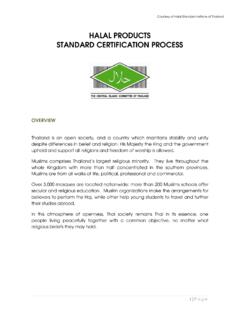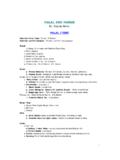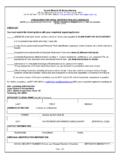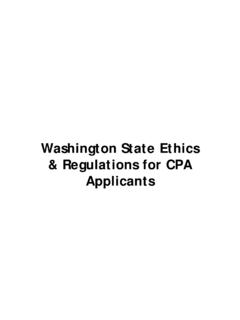Transcription of Halal Certification: an international marketing …
1 Halal Certification: an international marketing issues and challenges by Shahidan Shafie1 Prof. Dr. Md Nor Othman2 Faculty of Business & Accountancy Universiti Malaya, Kuala Lumpur, Malaysia Abstract marketing of products and services in the Muslim countries presents a very challenging task to multinational companies (MNC) due to the difference in political, economy and socio-cultural aspects. At the same time, MNC could not avoid targeting Muslim countries as their source of expansion as these countries represent almost 20% of the world s population. Furthermore, this figure is expected to increase to 30% by 2025. One of the most important concepts in Islam is the concept of Halal , which means permissible. Halal covers the aspects of slaughtering, storage, display, preparation, hygiene and sanitation.
2 It covers food as well as non-food category of products. Given the speed of trade globalization, the advancement in science and technology, and the on-going initiatives to simplify manufacturing processes, it is essential that the Halal concept be fully understood by marketers. This paper discusses the marketing challenges in dealing with the Halal issue. It makes reference to Malaysia s Halal certification policy and procedure as the country has set itself to become the major player in providing Halal products and services. This complements well with Malaysia s role as the Chairman of the 57-nation Organization of Islamic Conference (OIC) and its vision to become the global Halal hub Track: 13. international marketing and service Contact: Shahidan Shafie Address: 1829, Ptg Hj Hassan, 13220 , SPU.
3 Penang, MALAYSIA Tel: 6012 4097449 E-mail: 1 Shahidan Shafie is a PhD candidate at the Universiti Malaya, Kuala Lumpur, Malaysia 2 Md Nor Othman is a Professor of marketing and the Dean of Faculty of Business & Accountancy, Universiti Malaya, Kuala Lumpur Halal Certification: an international marketing issues and challenges INTRODUCTION In the Muslim majority, Malaysia, the concept of Halal is an absolute key to consumption. Muslim consumers nowadays are faced with a broad selection of products and services. On top of that, each product category offers many different brands either locally named or internationally recognized ones. Some of the local brands appear to capture their own niches by projecting themselves as Islamic brands via their creative packaging and labeling works.
4 This also indirectly signals to their primary target the Muslim consumers - the Halal status of their products. On the service side, similar efforts are being done in the banking and in the insurance sectors. The above scenario describes the situation faced by the Malaysian consumers as they go through their daily chores in consumer goods purchasing. There are many choices of brands and each brand is fighting each other for shelf space in order to get the attention of their target consumers. Besides the products and the brands available in the retail outlets, the Malaysian consumers are also offered various direct selling brand alternatives such as those in the personal care and cosmetic categories. Among the direct selling companies offering such products include international names such as Amway, Avon, Cosway and Nutrimetics.
5 The flux of international brands into the country is thought to be the result of a widespread use of the Internet and the e-commerce facility by the Malaysian consumers. Manufacturers and marketers use Halal certification and logo as a way to inform and to reassure their target consumers that their products are Halal and shariah-compliant. In general, the Muslim consumers in Malaysia look for the authentic Halal certification issued by the Malaysia s Department of Islamic Development (JAKIM) which is under the purview of the Ministry in the Prime Minister s Department. This certification 2granted the companies the use of Halal logo for printing on their products packaging or for the display at the company s premise. Given the speed of trade globalization, the advancement in science and technology, the continuous change in products formulation, and the on-going initiatives to simplify manufacturing processes, it is essential that the Halal concept be fully understood especially by the marketers of consumer goods be it for food or for non-food product categories.
6 This is important because as the consumers become more religious or Halal -conscious, they will be looking for products that not only satisfy their needs but also give them peace of mind. LITERATURE REVIEW Religion and marketing Religion is a system of beliefs and practices by which group of people interprets and responds to what they feel is supernatural and sacred (Johnstone, 1975). Most religion prescribes or prohibits certain behavior including consumption behavior. Schiffman and Kanuk (1997) assert that members of different religious groups are likely to make purchase decisions influenced by their religious identity. Such a phenomenon is widely acknowledged in international business and marketing textbooks. The Halal Logo As the Muslim consumers become more knowledgeable of their religion, it is inevitable that they will be more particular on the type of products and services that they consume or use.
7 In addition, as consumers become increasingly more sophisticated in dietary and health-related issues, the relevance of informative labeling and the belief in the right to be adequately informed will strengthen. 3 The introduction of Halal logo by the Malaysia s Department of Islamic Development (JAKIM) has generated more awareness among the Muslim of the importance of consuming products or engaging in services that follow Islamic guidelines and principles. See Exhibit 1 for details regarding Halal definition. Halal logo also signals which food outlets are permissible to be patronage by the Muslim. As a result, the logo provides an avenue for the manufacturers to indicate to their target consumers that their products meet the Islamic standard. This definitely will create significant advantage to the particular manufacturers versus its competitors that do not have Halal certification.
8 The usage of Halal logo has so far been skewed towards food products as the term Halal is better known amongst the Muslims and non-Muslims as being food that is permissible to be consumed. The logo has not been used much in other category of products. As for the service sector such as in the banking and insurance products, the more appropriate term for Halal would be Islamic-compliant or syariah-compliant. METHODOLOGY In investigating the impact of Halal phenomenon to the consumers and the companies in Malaysia, the author employs a combination of qualitative and quantitative research methodologies. Several personal interviews were conducted among the managers in the consumer products companies food as well as non-food category. In the service side, managers in the banking as well as in the insurance sectors were also interviewed.
9 To add to this, face-to-face interviews were also conducted among consumers attending Halal - or Islamic-related theme exhibitions. In addition, the author conducted a focus group study to assess, in-depth, the level of understanding of the Halal concept among the Muslim consumers. 4 Quantitatively, a survey method using questionnaire was employed to gauge the factors influencing consumers purchase decision. A total of 1000 questionnaires were conveniently distributed to Malaysian consumers in this regards. PRELIMINARY FINDINGS Some of the preliminary findings from this research indicated that there are many issues and challenges on the Halal subject. The Issues Some of the issues include: 1) the inconsistency of definition of Halal on the aspect of slaughtering of animal; 2) the introduction of Halal logo by individual firms; 3) the use of Arabic-sounded or Islamic-signaled brand names; 4) the rampant display of Quranic verses (or the use of Arabic characters) by food operators to indirectly signal that the premise is operated by Muslim and that it offers Halal foods; and 5) the lack of enforcement by the authorities with regards to the misuse of Halal logos.
10 The Challenges In Malaysia, one of the main challenges to the government is in the area of enforcement. The lack of enforcement by the Department of Islamic Development s (JAKIM) personnel in monitoring the usage of certified Halal logo has caused the public to question the validity on some of the products or services claiming to be Halal . Among the government ministries, there seem to be lack of assistance given to JAKIM by the Ministry of Domestic Trade and Consumer Affairs. The latter tend to focus on their own problems those that not necessarily relate to Halal products. JAKIM personnel lacked enforcement characters. It is thought that only with strict enforcement that the Halal logo will be seen more authoritative . 5In addition, the lack of collaboration amongst the world s Halal -certification authorities has created doubts amongst the Muslim consumers on the authenticity of the Halal certification process.











